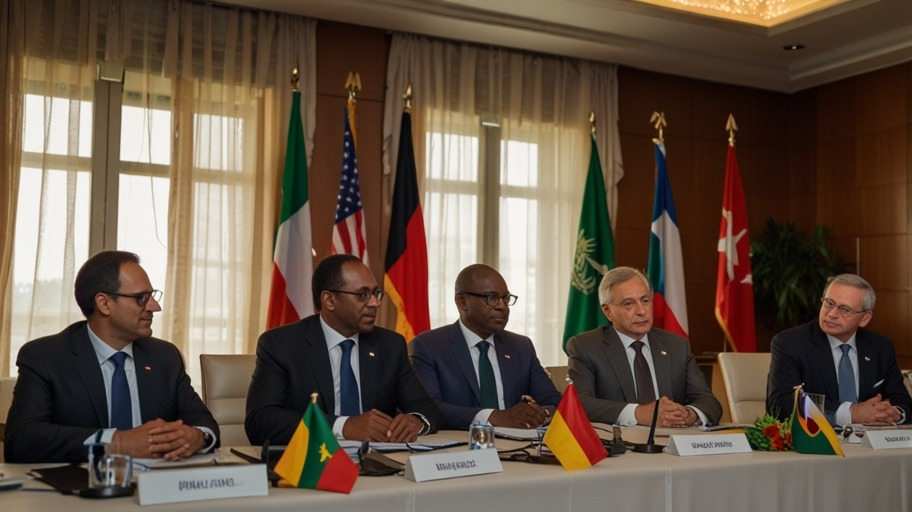The Role of Bolivia in Regional Trade Agreements
Introduction
Bolivia, a landlocked country in the heart of South America, has long played a significant yet often overlooked role in the region's political and economic dynamics. Its strategic location and abundant natural resources, including vast reserves of natural gas, lithium, and other minerals, make it an essential player in South America's trade environment. Bolivia's involvement in regional trade agreements, though sometimes constrained by internal economic challenges and external geopolitical factors, continues to shape its development and integration into global markets.
This article delves into Bolivia's role in various regional trade agreements, examining its participation in major South American economic blocs like the Andean Community of Nations (CAN) , Mercosur , and the Bolivarian Alliance for the Peoples of Our America (ALBA) . We also explore how Bolivia leverages its unique resources to negotiate favorable terms, its efforts to expand regional trade ties, and the challenges it faces in capitalizing on these agreements.
Historical Context of Bolivia in Regional Trade
To understand Bolivia's current role in regional trade, it's essential to explore its economic history and relationship with neighboring countries. Historically, Bolivia has been highly dependent on its primary resources, including minerals and natural gas. From the mid-20th century, Bolivia's economic strategy has focused on exporting these resources, making it vulnerable to global price fluctuations and dependent on neighboring markets for access to sea routes and international trade.
In the 1990s, as part of broader economic liberalization efforts across Latin America, Bolivia began to engage more actively in regional trade agreements. The country recognized that integration into regional blocs could mitigate some of the challenges posed by its landlocked geography and reliance on commodity exports Bolivia has sought to strengthen its role as a regional energy hub, using its natural gas resources as leverage in negotiations with larger economies like Brazil and Argentina.

Bolivia in the Andean Community of Nations (CAN)
The Andean Community of Nations (CAN) is one of Bolivia's most significant regional trade partnerships. Formed in 1969 by Bolivia, Colombia, Ecuador, and Peru (with Venezuela as a former member), CAN aimed to promote regional integration, economic cooperation, and coordinated development policies among its member states. For Bolivia, CAN has been a critical mechanism to facilitate trade, particularly by eliminating tariffs and improving access to larger markets.
Bolivia's Benefits from CAN Membership:
- Tariff Elimination and Trade Diversification : One of the most immediate benefits Bolivia enjoys as part of CAN is the reduction or elimination of tariffs on trade between member countries. This facilitates a smoother exchange of goods, allowing Bolivia to access new markets for its agricultural and industrial products, including minerals and hydrocarbons.
-
Promotion of Trade in Goods and Services : CAN's initiatives extend beyond goods to services, offering Bolivia avenues to diversify its trade portfolio. Bolivia has traditionally relied heavily on exporting raw materials, but CAN provides opportunities to develop and export services such as tourism, transport, and telecommunications.
- Regional Solidarity : CAN also serves as a forum for political dialogue and cooperation on regional development policies. Bolivia benefits from regional solidarity within CAN, particularly when negotiating with larger trading blocs such as the European Union and the United States.
Despite these benefits, Bolivia faces several challenges within CAN. One of the primary obstacles is the disparity in economic development levels between member states. Bolivia, with its relatively underdeveloped infrastructure and high levels of poverty, finds it challenging to compete with the more industrialized economies of Colombia and Peru.
Bolivia's Accession to Mercosur
While Bolivia has been a longstanding member of CAN, its engagement with the Southern Common Market (Mercosur) —comprised of Argentina, Brazil, Paraguay, and Uruguay (with Venezuela as a suspended member)—marks another significant development in its regional trade strategy. Bolivia first became an associate member of Mercosur in 1996 and later signed an agreement for full membership in 2012, though the accession process has faced several delays.
Bolivia's Motivations for Joining Mercosur:
- Access to Larger Markets : Mercosur represents one of the largest economic blocs in Latin America, with a combined population of over 295 million people and a GDP of around $2 trillion. Full membership would give Bolivia preferential access to these markets, particularly in Brazil and Argentina , which are among Bolivia's largest trading partners for natural gas and agricultural products.
-
Infrastructure and Connectivity : As a landlocked country, Bolivia's geographic isolation has been a significant impediment to trade. Mercosur membership offers opportunities for greater infrastructure development, particularly in terms of transportation corridors that could enhance Bolivia's connectivity to Atlantic ports. This is especially crucial for Bolivia's ambitions to become a transit hub for regional trade.
- Energy and Natural Gas Exports : Bolivia's vast natural gas reserves play a central role in its economic relations with Mercosur members. Bolivia exports significant quantities of natural gas to Brazil and Argentina, making energy a focal point of its integration into Mercosur. By gaining full membership , Bolivia hopes to further solidify these partnerships and secure long-term energy contracts that can bolster its economy.
- Diversification of Trade Partners : Bolivia's accession to Mercosur also allows it to diversify its trade relationships beyond the Andean region. Mercosur has trade agreements with several countries and economic blocs outside of Latin America, including the European Union, making it easier for Bolivia to tap into global markets.

Challenges of Bolivia's Integration into Mercosur:
- Economic Disparities : One of the main challenges Bolivia faces in Mercosur is the economic disparity between member states. Brazil and Argentina are far more industrialized and developed than Bolivia, creating concerns that Bolivia's industries may struggle to compete in a more open trading environment. There are also concerns about the influence that larger economies exert over the decision-making process in Mercosur.
- Agricultural Competition : While Bolivia's agricultural sector stands to benefit from increased access to Mercosur markets, it also faces stiff competition from the more efficient and technologically advanced agricultural sectors of Argentina and Brazil. This has raised concerns among Bolivian farmers about the potential impact of full integration into the Mercosur trade bloc.
- Political and Economic Instability : Bolivia's accession to Mercosur has been delayed by both internal and external political challenges. Domestically, Bolivia has experienced political instability in recent years, which has affected its ability to negotiate and implement trade policies. Additionally, the political and economic turmoil in Venezuela, a Mercosur member, has complicated Bolivia's accession process and raised concerns about the bloc's cohesion.
Bolivia and the Bolivarian Alliance for the Peoples of Our America (ALBA)
The Bolivarian Alliance for the Peoples of Our America (ALBA) is a regional bloc that takes a different approach to economic integration than CAN or Mercosur. Founded in 2004 by Venezuela and Cuba, ALBA promotes regional cooperation based on socialist principles, focusing on social development , poverty reduction, and the rejection of neoliberal economic models. Bolivia became a member of ALBA in 2006 under the leadership of then-President Evo Morales.
Bolivia's Role in ALBA:
- Political Alignment : Bolivia's membership reflects in ALBA its political alignment with leftist governments in Latin America, particularly Venezuela and Cuba. Evo Morales was a staunch critic of neoliberalism and US intervention in the region, and ALBA provided a platform for Bolivia to advocate for alternative development models centered on social justice and state-led economic planning.
-
Economic Cooperation : ALBA promotes economic cooperation through initiatives such as Petrocaribe, which allows member countries to purchase Venezuelan oil on favorable terms. For Bolivia, ALBA has provided access to preferential trade arrangements, particularly for agricultural goods and services. ALBA's emphasis on barter trade has also benefited Bolivia's small-scale farmers and producers.
- Social Development Programs : One of ALBA's most significant contributions to Bolivia has been its social development programs. Through ALBA, Bolivia has received funding and technical assistance for health, education, and infrastructure projects aimed at reducing poverty and improving living standards. This has been particularly important for rural and indigenous communities in Bolivia, which have historically been marginalized in national development efforts.
Limitations of ALBA Membership:
- Limited Economic Impact : While ALBA provides Bolivia with political solidarity and some economic benefits, its overall impact on Bolivia's trade has been limited compared to CAN and Mercosur. ALBA's member states are relatively small economies, and the bloc lacks the economic heft of Mercosur or other regional trade organizations.
- Dependency on Venezuela : ALBA's economic initiatives have been heavily dependent on Venezuela's oil wealth, which has diminished in recent years due to the country's economic collapse. This has raised questions about the sustainability of ALBA's economic model and its ability to continue supporting member states like Bolivia .

Bolivia's Future in Regional Trade
Looking ahead, Bolivia's future in regional trade will depend on several factors, including its ability to leverage its natural resources, improve its infrastructure, and navigate political challenges. Bolivia's integration into regional trade agreements offers both opportunities and risks, and its leaders must carefully balance These factors to ensure sustainable economic growth.
- Leveraging Natural Resources : Bolivia's natural gas and lithium reserves will continue to play a central role in its trade strategy. The country must negotiate favorable trade terms that allow it to export these resources while also investing in value-added industries that can diversify its economy and reduce its dependence on raw material exports.
- Improving Infrastructure : Bolivia's landlocked geography remains a significant obstacle to trade, and improving infrastructure will be key to overcoming this challenge. Regional trade agreements, particularly Mercosur, offer opportunities for Bolivia to invest in transportation and logistics networks that can enhance its connectivity to global markets .
- Navigating Political Instability : Bolivia's political stability will be a critical factor in its ability to participate in regional trade agreements effectively. Political unrest and changes in government have often disrupted Bolivia's trade policies, and ensuring continuity in trade negotiations will be essential for long-term success .
Conclusion
Bolivia's role in regional trade agreements reflects its complex economic and political landscape. As a landlocked country rich in natural resources, Bolivia must navigate the challenges of geography, economic disparity, and political instability to maximize the benefits of regional integration. Through its participation in CAN , Mercosur, and ALBA, Bolivia seeks to secure access to larger markets, promote social development, and diversify its trade relationships. As Bolivia continues to engage with regional trade blocs, its success will depend on its ability to adapt to changing economic and political conditions in Latin America.